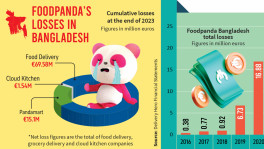When hunger threatens to kill you first
As schools and offices have been shut down, rickshaw-pullers have been unable to earn and run their families. Other types of labourers are also facing a shortage of work as every sector has come to a grinding halt

People who live on their daily income – such as domestic helpers, rickshaw pullers, vendors, hawkers, transport drivers and helpers and construction workers – have been worst affected ever since the countrywide shutdown started on March 26 to curb the novel coronavirus spread.
As schools and offices have been shut down, rickshaw-pullers have been unable to earn and run their families. Other types of labourers are also facing a shortage of work as every sector has come to a grinding halt.
There are countless beggars in Bangladesh – who survive on the charity of people on the streets – who are suffering greatly too.
The Business Standard brings you their stories.
'My income is not enough to run my family'
Nipa, 32, a domestic help in Dhaka's Mirpur area, plead with her employers to let her work despite the risk of coronavirus. Nipa lives in a makeshift hut in Mirpur's Extension Pallabi slum with her unemployed husband and three children.
She usually works all seven days in a week from early in the morning till afternoon in four houses.
"Currently, I am working at only one house, which is not sufficient for me to run my big family. We cannot eat properly," she said.

Rina, another domestic worker, is a mother of two children – an eight-year-old boy and a four-year-old girl. Her husband is a rickshaw puller. She is under severe stress as her husband's income has declined, and she has been furloughed by two of her employers out of four.
"Everything was going well till the news of the novel coronavirus came. Currently, I am working at two houses which is not enough to run my family as my husband's earning has dropped heavily," she said.
When asked whether she gets the government's free food support, Rina said, "I rushed to a nearby open market sale (OMS) centre but there I faced a long queue. I could not stand there as the centre was very crowded and most of the customers were male. I returned empty-handed."
'My entire family is suffering'
Enayet Ali, 41, who lives in Mirpur, came out with his rickshaw around 7am amid the shutdown but was unable to find any passenger till noon on Thursday.
He said, "I hardly get any passenger while the police once in a while drive us away."
"Before the outbreak of the virus, I would usually earn Tk600-700 per day. Currently, I am earning only Tk100-150 on average. Moreover, I have to pay Tk100 to the owner of the rickshaw every day.

There are six members in Ali's family and they live in his hometown Kurigram. He is the only earning member of the family. Due to the current situation, he cannot even send them money. My entire family is suffering, he said.
According to Bangladesh Institute of Planners estimate of 2019, there are approximately 8-10 lakh rickshaw pullers in Dhaka city. Ali is not the only person, there are many Ali's who are suffering due to the lockdown.
He said the government should take more steps to provide food and essentials to the low-income people who have lost their income sources due to the shutdown.
'I had only one banana in the last 11 hours'
Alauddin, 29, a disabled man, was sitting in front of an outlet of superstore Shwapno in Mirpur on Thursday.
He said, "I had only one banana in the last 11 hours. My sufferings have increased to a great extent as I live on the charity of people but they are not coming outside due to this shutdown."

"Now, I sit in front of this shop till noon as the markets are allowed to remain open till 4pm and people come to buy necessary things. I am here with the hope of getting some money and food from them.
"Before the shutdown, I used to sit in front of schools and colleges, parks, mosques, and could ask for food and money anytime. I would stay in places from where I could manage food to eat at night. But now, I barely get anything as people are staying in their houses," Alauddin said.
There were five to six beggars in front of another superstore in the area. When asked whether they get the government's free food support, one of them stated, "As most of us are physically challenged, we cannot go into crowds like normal people to avail the OMS service."
'Half of my vegetables go to waste'
Mizan, 22, runs a big family of six members, by selling vegetables on a van by the roadside in Mirpur.
"Because of the shutdown, people are not coming outside. I am sitting here every day but can barely sell anything," he said.

He said half of his vegetables were going to waste and he was facing a loss of almost Tk1,000 per day as there was no buyer.
"Wholesale suppliers have increased the rate. There is sufficient supply of vegetables but the demand declines due to the lockdown," he said.
"If I close my van even for a day, I will not be able to feed my family," Mizan added.


 Keep updated, follow The Business Standard's Google news channel
Keep updated, follow The Business Standard's Google news channel
















